#And the disillusionment and loneliness that came with it
Text
Self-care for the Soul: Hinamori's Edition
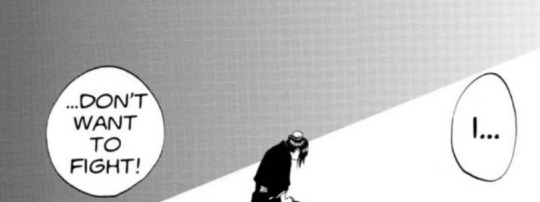
(Or, my 2am rambles on Hinamori that briefly touch on nonviolence while I lightly express some fandom guilt ft. one mention of Frankenstein and some Tobiume hc 🫠 Thank you @bleachbleachbleach for your encouraging words on this post! <33)
TL;DR: Much of Hinamori’s external life has been chosen for her. She thrives at exercising a form of internal non-violence of the spirit, where despite the lack of tools (as a Rukongai ghost) and later in spite of the master’s tools (the Seireitei), she asserts her power through choice - choosing to love, defend, create - through which she fights back against the institution that created and enabled the violence inflicted upon her. This is in her nature, always has been since she befriended Hitsugaya to rescuing Hisagi.
"Be like the bird that,
passing on her flight awhile
on boughs too slight,
feels them give way beneath her,
and yet sings,
knowing that she hath wings."
-Victor Hugo
Sometimes I feel like such a fake Hinamori fan
because I worry that my interpretations discredit her character, which isn't what I want at all!
With regards to Aizen and forgiveness, I get a sense that the popular belief is that it is in Hinamori's nature or best interest to come to reject everything about their relationship, that she would even hate him, want to enact some form of violence on him. And that's all fine! I mean, anything is believable if you come at characterization from the lens of “what would make a character do XYZ?"….but I just can't help but feel like this is us (or at least me) moving on without her - which is how Hinamori canonically felt post-Winter War (and I would go so far as to say she's been feeling like this for a long time, since before leaving for the academy).
Like, would it help Hinamori to hate everything about him? To reject all of him? What is she, someone who deeply values her relationships and what she gets from them as much as she gives, choosing to leave behind by doing so?
So much of her (external) life happens to her: she has to enter the academy because her powers awakened, she was pre-selected to join the 5th division for a plan that started decades before her and would be put into motion a few decades later, and of course both stabbings.
Given this, I think Hinamori is someone who
appreciates making a choice of what she's given, often internal, often against the status quo, and gains exactly what she needs. She chooses to befriend Hitsugaya despite the village's rejection of him (and finds herself a lifetime partner); she stays behind to give Hitsugaya a proper goodbye even though it'll make her late to the academy on her first day (to keep Rukongai close which feels especially important given Seireitei wants to neglect, forget what's outside their walls); she chooses to save Hisagi against his orders (and years later she can look back and know she's brave); she chooses to defend Renji despite Byakuya's authority and Kira's acquiescence (and realizes that to stand up for what she believes in she may be the only one in the room left). And if she chooses to hold close the fond memories she created with Aizen and the lessons she learned from him, she'll know that under all his power laid her power too.
These choices she made are all born from her internal character and I think that's something she tries to hold onto (even when it feels like everyone is moving on without her, that the narrative is moving on without her, that fandom sometimes moves on without her).
And it's not because of the naivety or delusion that's so often attributed to her. It's this instinct to create, to save, to love, despite the lack of tools (and then in spite of the tools). I don't think it's far-fetched to believe that she, an artist who spends her free time reading (about history and fantasy, about the past and the future) would try to create what she needs, imperfect as it is. Hinamori has always been a "be the change you want to see" type of person.
Unlike Hisagi who fears his power in his own hands,
Hinamori fears her power in the hands of others. In a way, it's a rejection of the Seireitei. In a way, it's a
rejection of the institution that created and enabled
the violence inflicted upon her.
——
(Another reason why I feel like a fake Hinamori fan is because I don't think she needs bankai to tie up her arc or to prove/reclaim her power. Like I mentioned above, I think Hinamori does a pretty solid job of reclaiming her power outside of Seireitei's tools. Bankai feels almost like a resignation to me. It's hard to explain without needing 2000+ words and referencing Frankenstein, the internal/spiritual nature of nonviolence of a solider, and elaborating on Hisagi
and Kaname because these two are very much part of the same conversation.
But anyways! My Tobiume hc plays into all of this. It's pretty much the same as the rest of the fandom's - some iteration of a phoenix + forest (I love the seagull cry when Tobiume releases and this imagery of being rooted deep in the earth with an expansive sky to soar above this middle space where the man-made sits), but I hc that she's never really been able to see Tobiume. That Tobiume always wants to keep just out of sight, perched high in the trees or a shadow over the sun to keep her wondering because Hinamori is an artist (who once had no brushes), a life-long learner (who once had no books), and I think it’d be neat if her inner world was something she created out of imagination and hunger for somewhere beyond her body and something beyond the constraints of their
society.
Another poem I associate with her is "Cherry
Blossoms" by Toi Derricote:))
#I received a question asking why I like aihina and this hc derailed that entire post#I will answer it! I just need to organize my thoughts and focus more on their actual relationship#On what Hinamori was looking for amidst this transition between Rukongai soul (ghost) and shinigami#And the disillusionment and loneliness that came with it#I got like 8 panels that I think depict this particular brand of loneliness Hinamori (and Aizen) carry#bleach#hinamori momo#bleach meta#momo hinamori
55 notes
·
View notes
Text

@theneutralmime
Oh I have a LOT to say about this, this got really long.
For one, comparing ONLY Luke and Anakin ignores the MANY MANY MANY other Jedi we are introduced to in the PT who seem perfectly successful and happy as Jedi, most notably Obi-Wan, Yoda, and Mace Windu. If we include TCW, you can bring in a bunch of others like Luminara Unduli, Aayla Secura, Quinlan Vos, Kit Fisto, Plo Koon, Adi Gallia, Eeth Koth, Saesee Tiin, Jocasta Nu, and Tera Sinube. All Jedi Knights and Masters of varying ages and species who are all VERY happy and successful Jedi. So it seems a little disingenuous to ONLY compare Luke to Anakin and come to the conclusion that full training doesn't work when there are plenty of OTHER Jedi from the Prequels era who weren't, you know, genocidal maniacs.
And sure, some Jedi can leave. The Jedi don't force anyone to stay. But let's look at those people who left. Nearly ALL OF THEM leave because they end up turning to darkness and becoming evil, so I feel like that doesn't really speak to the Jedi having done something wrong and more about how if you leave the path of the Jedi, you're probably going to lose your sense of compassion and selflessness. But even among those people, the thing that causes them to turn on the Jedi is generally NOT THE JEDI THEMSELVES, but an outside force or event. For characters like Barriss and Krell, it's the war and the hopelessness and despair it creates. For characters like Bode and Malicos, it's Order 66 and the loneliness and trauma of that sudden loss. For Ahsoka, it's being framed by a friend who was no longer a Jedi and a lack of trust in herself (this changes after the Disney buy-out and Ahsoka DOES start blaming the Jedi for leaving, but she doesn't initially, and for a while she's still intentionally said to ACT like a Jedi and is implied to be seriously considering returning to the Order before Order 66 happens). Dooku is more disillusioned with the Republic and the Senate than he is the Jedi themselves (this, again, has been more recently changed to be a disillusionment with the Jedi, but that's not at all true in earlier iterations of him). Even with Anakin, what causes him to betray the Jedi isn't actually a dislike of the Jedi themselves, but a fear of losing someone he cares about who isn't even a Jedi herself. So all of the people we know who leave the Jedi in this era don't actually do so because the Jedi do something wrong and most of them become evil as a result.
It's also notable to point out that if we're counting Luke as "half a Jedi" because he didn't get the whole experience that someone during the Prequels era got, Anakin counts as one, too. He came in late and wasn't raised among the Jedi, he never got that kind of experience, so making the comparison to Anakin is an even worse comparison than normal because it's comparing an abnormal experience to another abnormal experience. It's like comparing a Satsuma tangerine to a Mandarin tangerine and saying, "See? The first one is better than the second one because it's only half an orange." Neither one is a real orange, they're tangerines. Anakin cannot be used as an example of the Jedi experience during the Prequels era, so the idea that you could claim Luke "worked" and Anakin "didn't" specifically because Luke only got partial training makes zero sense.
For two, it seems a little ridiculous to act like the Jedi who exist post-Order 66 are "half a Jedi" at all. They're not. Just because being a Jedi looks different during this period doesn't mean they're not Jedi or only sort-of Jedi.
There's characters like Kanan Jarrus and Cal Kestis who were Jedi Padawans when Order 66 happened and were also "half trained" I suppose, but they were RAISED as Jedi in a way Luke was not and both choose to come back to it and that reclamation of their identity as Jedi is immensely important to them. I don't think either of them would consider themselves "half a Jedi."
And LUKE would never consider himself "half a Jedi" at all. The famous line from ROTJ isn't "I'm half a Jedi, like my father before me" is it? No. Luke is a JEDI, wholly and completely, I don't care how much training he got in comparison to PT Jedi, he considers himself a Jedi Knight and so does everyone else he ever meets, generally. And the only other character similar to him that we see is Ezra, who ALSO seems to consider himself a whole Jedi and not "half a Jedi" despite the fact that he, like Luke, came to training later than was normal during the Prequels era.
But also the entire statement of "If the Jedi had allowed people like Luke to exist" is so funny because like... gee who do we think TAUGHT Luke to be a Jedi? Could it perhaps be, I dunno, TWO JEDI MASTERS FROM THE PREQUELS ERA JEDI ORDER? The Jedi DO allow people like Luke to exist because OBI-WAN AND YODA LITERALLY TRAIN LUKE TO BE A JEDI. I don't know what more they need to see to understand that Luke WAS allowed to be a Jedi by GETTING TRAINED TO BE A JEDI BY TWO JEDI MASTERS. This isn't even like Ezra getting trained by Kanan who was only a Padawan before, this is YODA AND OBI-WAN, two Jedi MASTERS who were on the COUNCIL before. I guess the idea behind this statement is that they only "allowed" it because Order 66 happened and they had no choice, but like... this is ridiculous. If Yoda and Obi-Wan truly believed Luke shouldn't be a Jedi, they just wouldn't have trained him.
What I think this person means by "people like Luke" is people who were raised in a regular nuclear family and only start training to be Jedi in adulthood, with the assumption that this means Luke's first priority is still like... his family and friends MORE than being a Jedi. This goes along with the assumption that Luke succeeds "because of his attachments" and because he "goes against the Jedi's teachings" in the end with Anakin. There's this common belief that Luke choosing not to kill Anakin on the Death Star is Luke acting UNLIKE a Jedi, or at least, unlike a PREQUELS Jedi. All of these assumptions are wrong. Straight up flat out WRONG.
Luke succeeds because of his compassion, because he acknowledges his own anger and darkness and chooses not to act on it. It's not that he refuses to kill Anakin because Anakin is his father, he refuses to kill Anakin because if he did, then he'd be doing so out of ANGER and FEAR, because Anakin is no longer a threat and is lying defeated on the ground so killing him at this point makes him a murderer. Luke would have made this same choice NO MATTER WHO HE WAS FACING IN THIS MOMENT. And I find this to be something a lot of people miss and misunderstand about this moment. Yes, Luke cares about Anakin because Anakin is his father, but the connection he makes with Anakin in this moment isn't between father and son, but between two people who have felt fear and pain and let themselves be controlled by it. Luke sees the mechanical arm after he cuts off Anakin's hand and it forces him to remember Bespin, the fear he felt for his friends and the advice he chose to disregard from Yoda and Obi-Wan then, and what it ultimately cost him. And it forces him to realize that Anakin, for all that he's done monstrous things, was once a person who got scared and angry, too, who let it control him the way Luke once did, and it cost him. This allows him to feel COMPASSION for Anakin, to see Anakin not as a monster or as this broken dream of his father, but a PERSON. A person who was once like him.
And then by stepping back and refusing to kill Anakin and making the pronouncement that he is a Jedi like Anakin once was, it also then forces ANAKIN to see that same connection. Luke sees him as a person, a person who made mistakes just like Luke did, so maybe he can see himself as a person who can make the same CHOICE as Luke is making, too.
So it's not about their personal connection to each other as father and son at all, really. Like they HAPPEN to be father and son and maybe this allows Anakin to make that connection a little easier because he cares about Luke enough to make that sacrifice (I don't personally believe Anakin would've made that sacrifice for Han or Lando even if they'd refused to kill him either), but for Luke? It isn't about that.
The anger from earlier, though? THAT was the attachment. I imagine this person you were speaking to probably didn't know that Lucas (and the Jedi as a result) use the word "attachment" in the way Buddhism defines it, which refers to a relationship with someone or something (it could be a place, an ideology, a dream, even a piece of clothing) that you cannot let go of because of the way it makes you feel, even after it starts being detrimental to yourself and the people around you. Luke's feelings for Han and Leia are what push him to Bespin to save them, even though both Yoda and Obi-Wan are telling him it's a trap and there's likely nothing he can really do to help them so he's better off staying on Dagobah to continue his training. And Luke ends up getting some information he's not ready for, he doesn't save Han OR Leia, Leia and Lando have to actually come back to save HIM, and he loses a hand. Luke doesn't go to Bespin because Han and Leia need him, he goes to Bespin because he can't bear to LOSE THEM. On the Death Star, he attacks Anakin because Anakin threatens Leia, and his fear of losing her causes him to get angry. It's not really about saving Leia because what Luke is becoming in this moment isn't someone Leia would ever support, but because Luke can't bear to lose her. THAT'S what attachment is. His attachment to Leia nearly costs him his father (consider the parallel between how Anakin's attachment to Padme DOES cost him HIS father figure because he refuses to stop fighting Obi-Wan and reconsider the choices he's making).
The attachment isn't what saves Anakin, it's what nearly kills him. It's the Jedi COMPASSION that saves Anakin. It's only because Luke EMBRACES what being a Jedi means, wholly and completely, that Anakin doesn't end up killed by his own son.
So what this person MEANS is, the Jedi would've been better off they'd allowed people to be more Western, if they'd let people grow up in a nuclear family structure, if they'd let people get married and have children, and if they'd let their members prioritize their personal connections over the fate of the galaxy because that's how they define love. What this person might not REALIZE is that their personal biases are devaluing any kind of life other than the one they're familiar with. They can't conceive of growing up in a more communal family structure where this isn't a specifically clearly defined "mom" and "dad" raising their kid(s) together. They can't conceive of a culture that either never feels the NEED to get married or have children or doesn't mind making that sacrifice (this isn't even specifically Western, Catholic nuns and priests make the same sacrifice because their relationship to God is more important than getting married and having children). They can't conceive of a culture where they actively choose to love everyone equally and never prioritize their own family and friends above strangers.
So this person you were speaking to I think has a fundamental misunderstanding of Luke as a character and his relationship to being a Jedi as well as a fundamental misunderstanding of what the Jedi were and a personal bias against a culture they're unfamiliar with. We're so often fed this story that if you aren't in a romantic relationship, then your life is basically hell on Earth. Everyone everywhere must be looking for this one special person, they MUST want that above everything else, and if they don't, then something in them is BROKEN. So the Jedi can seem very aloof and distant and fundamentally broken to viewers primed to see something like this as like... signals of an evil character, signals of a repressed character who needs to be saved, signals of corruption. But in fact, the Jedi are supposed to be symbols of the best humanity has to offer. They are the LEAST corrupt people in this entire story, the least evil people in the whole galaxy. They are a people who have figured out how to become the best version of themselves and spend their entire lives in service to the rest of the galaxy, passing on their wisdom and using their abilities to help anyone they can. They are an ideal to strive towards, not a cautionary tale.
Luke is not a success because he DOESN'T act like the Prequels Jedi, or because he is able to rise above them and become what they could not or what they had forgotten how to be. He is a success because he DOES act like them. He is a triumph because he represents the return of these people who always symbolized peace and compassion and hope.
I've called the Jedi a barometer for the galaxy's health before. The more there are, the better it's doing. At the beginning of the Prequel Trilogy, there are thousands of Jedi and the galaxy seems like it's GENERALLY fine, but with the return of the Sith, we also see our first Jedi death. And then in AOTC, a war starts and almost 200 Jedi die. By ROTS, even more Jedi have died and the Sith are more in power than ever before, and it ends with the Empire rising as the Jedi are all murdered. If we ignore all the different TV shows and skip ahead to the Original Trilogy, things only start to get better when the Jedi start coming BACK. Obi-Wan leaves Tatooine and brings Luke with him, who has just started Jedi training, and the Death Star is destroyed, saving the Rebellion. Luke commits to being a Jedi and the Empire falls, the Sith are destroyed, and the prophecy completed. Jedi represent all that is good, they represent a healthy balance in the galaxy. The galaxy ISN'T OKAY with the Jedi gone and it's at its best when the Jedi are at their strongest.
The Jedi DO allow people like Luke to exist because Luke is representative of the Jedi who came before him, the BEST the galaxy had to offer. Luke is representative of a culture that only ever did their best to be kind. Long before Rey, LUKE was "all the Jedi" because there didn't used to BE anybody else. Luke was the sole person keeping the Jedi's culture alive and he is bringing with him the training he got from two of the best, wisest Jedi Masters of the Prequel era. ALL OF THE JEDI were like Luke. All of them. Because they were ALL compassionate, they were ALL capable of putting aside their fear and anger in favor of understanding and acceptance, they were ALL people who fought back against the darkness and won. Luke succeeds because he becomes more and more like THEM.
The last thing I'll point out is that the Jedi's defeat doesn't happen because the Jedi failed at anything. The Jedi did everything right. But as everyone knows, you can do everything right, and STILL LOSE. They lose because the world and people around them failed, becauase the Senate and Anakin gave in to their own selfishness and fear and greed. All those "normal" people who were raised in regular family structures and prioritized their personal connections above their duty, they FAILED. But it was the JEDI who paid the price for that failure, so fans continue to blame them for everything instead of recognizing them as the victims they are.
105 notes
·
View notes
Text
I have a silly and indulgent Very Important People fan theory:
Very Important People!Vic Michaelis is extremely insecure and lonely as shown by their dialogue throughout many of the currently released episodes. They seem down on their luck and frustrated by their lot in life especially in their career and their personal connections. They seem like the perfect character to go through a classic “self growth through a journey of meeting crazy characters” plot.
Each of the characters seem like out of this world caricatures of people they could meet out in the world, and some (like Denzel and Vic’s Grandma), seem like representations of those in her actual life (I also have a fun theory that the dolls were her childhood dolls). Many of the characters themselves point out that Vic seems to be down on their luck and unhappy, and in some way preventing themselves from happiness. Off the top of my head, Vic has referred to their father being murdered, a divorce from their husband, and struggling to get a “real reporting career.”
If I had to construct a story of how they got to this point I would say the death of their father pushed VIP!Vic into grief induced isolation and loneliness, which inhibited their personal connections as they were stuck in survival mode. The murder of their father inspired them to become a reporter, as an attempt to help other victims of violent crime, but they are struggling to find a foothold. Their unbridled grief and obsession with retribution for their father has put a strain on their marriage and their partner asks for a divorce. Maybe in their exasperation and the chaos of life they are spurred to follow a lead they have no business or jurisdiction to follow and they end up injured. It is in this injury they are experiencing this hallucinogenic state.
The VIP set itself feels very cultivated and its “old-fashioned” eclectic style gives it a vibe of a surreal manufactured reality. Each episode starts with Vic idly messing with some aspect of the set, before realizing the camera is on and putting on the reporter mask. In my memory, none of the people “on set” ever say anything, besides Vic and the interviewee, even when Vic audibly asks them questions. Additionally the cutting off to infomercials gives an uncanny feeling of parody, someone concocting the stereotypical formula of a show. Finally, there are the moments where there is an abrupt cut to a transition card from a more intense scene, almost to redirect the emotional plot. Overall, it has given me a kinda WandaVision vibe of a dreamlike state manufactured in VIP!Vics head in order to address their loneliness and disillusionment with life.
The closing question especially points towards this specific idea of VIP!Vic being stuck in this fugue state looking for answers: “What is the meaning of life?” This is both impactful if we go with the idea she is injured and experiencing this all in an unconscious state (almost "deciding" whether to wake up) as well as just in them searching for the next direction to go in their frozen life. What is the meaning of life amidst grief, loneliness, fear, and unfair circumstances? How can Vic find meaning? In creating this dreamlike fabrication, VIP!Vic is trying to recover and find a version of themselves who can live a more fulfilling life as they let go of the past which has held them back. “Remember to always be yourself, unless you'd rather be somone else”
TLDR: Vic Michalis is having some sort of surreal, unconscious dream where crazy characters are attempting to help them heal from their father's death, their fucked up social situations, and to find meaning and happiness in their life. Through the interviewees eccentricities they teach Vic their personal meanings of life so Vic can find their own.
(This is all just to be silly, I know a lot of it is just stylistic choices of the show and the nature of the type of show it is, but I just love the show a lot and this little theory came to me)
#vic michaelis#very important people#dropout#dropout tv#vip#dropout.tv#this may be incomprehensible to anyone but myself#and is 100 percent light hearrted
60 notes
·
View notes
Text
Astrological Predictions I Wrote Down Last Year Which Are Still Relevant- and will continue to be!

Note: I'm not here to spread fear and anxiety. Bad aspects do not exist. Our lives and the way the Art Of Astrology is expressed in our reality is a mix of different colours and vibrations. These predictions have been made with my own personal way of interpretation so please don't ask how I came up with some things. Don't drive yourself crazy trying to see the "mechanics" and "practical details" behind the predictions, simply read them and see if intuitively you vibe with them. Keep in mind these are written in a "personal notes" style so it is a tiny bit chaotic!
A year ago I did not post any content about astrology and tarot online, at least at this scale. Posting these personal observations is not a way fro me to "toot-my-own-horn". I'm actually quite skeptical about Astrology's capacity to "predict" but right now, looking at those notes it is apparent that most of those things have already manifested or are beginning to take form in our physical reality.
Enjoy and let me know what your thoughts are about what's coming.
2023 MAJOR ASPECTS
Pluto In Aquarius (23/3/2023, 3 months and then again in 2024): 20 year cycle, society, tech, consciousness, innovation on STEROIDS, last time 795,819, 1781 -> discovery of uranus, islamic/arab domination in north africa, fall and rise of dynasties in europe (foundations of europe as we know it now, al-Khwarizmi founded the field of algebra
Saturn In Pisces (7/3/2023, 26 february, may 2 2026): structuring the "unstructureable"
Jupiter In Taurus (16/5/2023-25/5/2024): wisdom of nature, stay ready/still, green
17/7/2023 -> N.Node in Aries/S.Node in Libra: love-war, Ares-Aphrodite, war between the feminine and the masculine. Fall of red pill and radical feminism, individual vs parrtnership.
Where Jupiter goes, Saturn follows. Dune, The Hermit energy. In the past few years with Jupiter in Pisces and Aries disillusionment was IN! Fights through screens (Aries), were just another day. Saturn clears the way after Jupiter's orgy. Dreams NEED a practical use (note from now : we have this whole hustling culture thing of set goals and be practical, we are basically trying to give structure to our dreams and create a step by step path to our vision). Example: astrology, NFTs and crypto, drugs, manifestation, art -> how are they contributing to our society and the betterment of it? Dissolving-then Forming-> identifying, dreaming-act/plan -> success. Only through the loss of individual power we realize we are nothing without a link to the rest of "life". Submitting to something greater/ fear (misty) of something destroying us or confronting external life. Sacrifice/Servitude. Who are you when stripped away from the world? (prison): stripped off the matrix/network, inner contemplation, power to serve to experience unity, science+spirituality meeting. loneliness + isolation = going deeper within,monk mode. developing a conscious ego. Information utilized/weaponized to help/guide the masses. Increasing consciousness and broadening the mind. We are realizing we are experiencing the "shadow" not the "idea" (Plato/Jung/archetypes)/Antigone-> divine law / human law/ loss of faith and search dor a new framework of values. Discipline in meditation, yoga driven towards God. Fight between atheism+spiritualism/nihilism+purpose. Turning inside because you lost faith, there you will find God and meaning. The form has outlived its usefulness -> conflict with the status quo and law. No church in the wild/godless. Saturn's death by Jupiter (taurus = structure).
Transformation of rules, social norms, ideas of humanity and how we use science+technology to manifest those ideas. Social + technological REVOLUTION. Renaissance. Turning to humanitarian, liberal arts/spreading knowledge-teaching. Astronomical discoveries, vaccines/antibiotics(shortages?), innovations in trade, change in the way religions and churches are structured as well as other organizations. More open. Blockchain. "Anonymity" but transparency. 48 laws of power, the prince. philosophy-> utilitarian/kant/pure reason. "how to maximize happiness for the majority. streamlined techniques. Pluto in Aquarius will bring the desire to reform. After 2044 these changes will be established. Everything will be brought to the surface. going deep and facing demons. PROMETHEUS MYTH , FIRE -> DARK SIDE OF TECH (note: AI). decentralised internet, open sourcing, energy. YOU CAN'T REACH GOD THROUGH TECHNOLOGY/CAN YOU? Grid failures+extreme weather. Internet cables connecting countries -> separation from WEB -> Who are we? power over...= domination / power with...= networks Pluto -> Πλούτος, abundance but can turn to greed -> eruption -> realizations. Society = individuals -> change= self change!
Society is going to turn its hopes, wishes , knowledge, resources and tech powers towards abundance and sustainability. Physical environment = abundance. I'm seeing a rise in holistic+cyclical approaches, natural medicine and art expression close to natural processes. Expect movement from big cities to the countryside and creation of luxury reatreats/hotels close to nature-sustainable.
source:thesirencult
#astrology#astrology tumblr#astrologer#astrology tips#astro observations#predictions#2024 predictions#intuitive readings#pick a card#pac reading#pick a pile#tarot#pick a photo#pick a picture#tarot reading#psychic#intuitive messages#intuition#intuitive#pluto in aquarius#saturn in pisces#jupiter in taurus#the age of aquarius#source: thesirencult
124 notes
·
View notes
Text
So I may have come up with a whole Villain Jimmy AU...
Listen. I have way too many feelings about the events of Jimmy's Empires S2 Episode 31 and the immediate following stream. I also have way, way too many feelings about whatever the hell is happening in Sausage's and Shubble's lore and whatever is to come in Lizzie's, so I decided to only indulge one brainrot at a time and came up with... an interesting concept? I dunno, I'm easily entertained—
(There's a TLDR at the end if you don't want to read my insane and incessant ramblings o3o)
Ok so, after Walmart WRA kills Jimmy on the bridge for the kicks and giggles, Jimmy really starts questioning just what respect is and who his friends actually are. The conclusion? Dude has absolutely zero friends. Sure, he has this truce going on with Joel, and Katherine has been somewhat trustworthy so far. But actual friends? Nada. Closest thing he had were Scar and Tango, but they're gone now and he didn't even get a proper goodbye. His town is empty. He's alone.
Jimmy may be quick to anger, but this might be the first time he actually allows himself to be sad about it. There's something much more painful than rage crawling inside of him; be it guilt, self-hatred, loneliness, betrayal, there's just so much he's been burying under all the fighting that he can barely breathe through it all now. But once it's over, Jimmy's left with a strange feeling of clarity. This cold bitterness and complicated self-awareness that would turn into something far more sinister in the future.
The next day is really what decides his next course of action, though. He's touring the Old Sheriff around the server, kind of holding onto the last hope that someone might want him to stay after all. But then Fwhip comes along and decides that no, he doesn't get to have this, so they start bickering like the old divorced couple they are, like nothing's changed. Somehow, Fwhip manages to charm his way into the Old Sheriff's good books despite everything that Jimmy has said about his ex-deputy.
Martyn (that's what I'm calling him, he doesn't get his own name now) laughs at his jokes, makes little comments that... sound so familiar to Jimmy. This is how it all started: little comments — and this is how it's going to end. Maybe the Old Sheriff has good intentions. Maybe he does have the intention to stick with Jimmy and be a friend/mentor to him. But Jimmy, still raw from his most recent disillusionment, can't bear the thought of befriending someone only to have the rug pulled from under him again.
So Jimmy leaves Tumble Town in the dead of night.
Now, his first objective is to bring himself back to normal. He had to admit, no matter how hard he tried, it was hard to gather any respect from others when he was trapped in the body of a literal toy. He had already asked Joel to reverse this nonsense, but the god only offhandedly mentioned that this was Jimmy's true form and that it was how he was meant to look — which Jimmy took as "I have no idea how to, my name is Joel and I'm irresponsible with my powers and incompetent and also really short". So his next destination is the Witch Academy.
He had heard about the them from Shelby. She was a nice witch — or, well, nice enough. She was clearly going through some stuff at the moment, which is why he thought it would be better not to ask her for help to begin with — and was clearly able to change people's bodies, whether intentionally or not. So surely the people who taught her magic would be able to help him, right?
Little did Jimmy know that most witches do not, in fact, give a damn about helping other people. After travelling far and wide, he explained his curse to them, and all they did was close the door on his face.
Well, he's not having it! If the witches won't help him, he'll find someone else who will! This is when Jimmy starts travelling around in search of someone, anyone who could undo his curse so he may start his life anew. Through all the ensuing shenanigans, he gathers some... interesting allies.
It's not that he wants to ally himself with undead pirates; he may not be a sheriff anymore, but that doesn't mean he's about to become a criminal! But alas, when the boat he's travelling with is captured, it's not like he can do much else.
Jimmy is spared due to his... interesting predicament. Well, surely this tiny tiny man could be useful! Besides, didn't he use to live close to Pirate Joe? So in exchange for some information on Skeletron's rival and helping them get some treasure for a little while, Jimmy is dropped off at the next port with directions to a shady wizard who might be able to solve his problem.
When he gets to said wizard, they are already expecting him. You see, this is the same wizard who gave Scott his magic eye, and although I'm sure we'll get some actual canon explanation to it eventually, this is an AU in which the wizard may have some... ulterior motives. And they may or may not have been spying on a certain god who lives very close to Chromia. But that's a story for another time!
Jimmy wakes up the next day his normal-sized, human self again! It's almost overwhelming, how much he loves his own body right now. His chest quite literally aches... and that's when he notices a heart-shaped scar on it.
The wizard is still around. They explain to him that, to deal with the curse, they had to remove his heart. Literally. They stored it in this lamp, which emits a blinding red glow — an indicative of how strong it is, how much it feels. The farther away he is from it, the more detached he will be from his feelings. Although that would mean he should probably carry it close at all times, he should not forget that it is still his actual heart; you better keep it safe, kid.
Now that the deed is done, the only thing that the wizard asks for is a front row view when Stratos falls. Jimmy carries a lot of grief, clearly, and if they know anything about him — which they shouldn't, but they strangely do, — he is going to get back at the people who made him miserable for so long. It just so happens that the wizard also has a beef with Joel, so really, they both win in the end!
After some not-so-subtle persuasion and reminders of all the horrible things Jimmy had to endure in the past, the wizard manages to convince our ex-sheriff into going back to the empires to truly bring an end to this story of pain. He's never going to be able to start anew unless he gets rid of all traces of his weak past self, right? His enemies deserve to reap the hate they've sown fashioned in cold blood, right?
And so Jimmy concocts a plan, gathers resources and new (purely professional and with no emotional attachment, never again) allies, and returns to Tumble Town a new man with a new name. In the day, he's a charming and friendly traveller sneaking his way into the emperors' hearts. At night, he's a dangerous bandit carrying a lamp of dwindling red light, playing a game of metaphorical chess with the authorities to bring the pieces of his plan closer together.
-
TL;DR Jimmy leaves the empires bitter with his friends, searches for a way to turn back into a regular human and finds a wizard who does so in exchange for being able to watch the world burn. To reverse the curse, he had to lose his heart, which he now carries in a red lantern closely tied to his feelings. He goes back home for revenge.
Calling this one the Red Light Bandit AU òwó
#Red Light Bandit AU#please ask me more about it I'm reeling-#Empires SMP#Empires season 2#Solidarity Gaming#Listen I know that the actual heart has nothing to do with our feelings#Magic works in strange and macabre ways don't worry about it#This goes with the Count of Monte Cristo idea I had the other day#I need a villain Jimmy who is Bitter and Resentful and Cursed in more ways than one#(Tried to highlight the first letter of each paragraph to potentially help with reading the these long blocks of text;)#(I have no idea if it actually helps please tell me if there's any better method I can use!)#TEV Talk#Don't Mind Me I'm Writing My Blorbos#RLBAU
95 notes
·
View notes
Text
@corignem said: I love you, it's ruining my life. ( seblijah )

it didn't matter how loudly sebastian had spoken those words - they still echoed loudly in elijah's head. deafeningly so. and the person who was usually so full of things to say - so quick to retort was just quiet. for the longest time, just silent.
it had been so long since someone had said those words to him. ' i love you '. he's been alive for over four hundred years and he can barely remember hearing them. they would have been spoken in a different context, of course. a parent to their child, something that should be said, should be felt. but between now and then there's been centuries of a life without that. years of poison being drip-fed, years of being moulded and shaped into something dark and volatile. and then there was the disillusionment and the anger and bitterness that came with it. the loneliness that he'd already had turned into so much more because once he'd learned the truth, he didn't even have his council anymore. didn't even have somewhere to belong to now.
and while that feeling, that need for that feeling of not being alone, of being loved was something that had never gone away... - it was also scary. which was ridiculous when thought about. elijah moore, lone-wolf, who wasn't afraid of anything... was scared of being told something good. something real and good.
it threatened everything he knew about himself. the way a part of him wanted to lean into that good. and it didn't help that the person it came from was the person that he'd wronged, and the person that was supposed to despise him the most.
and he still couldn't find words. didn't know how he was supposed to navigate this because it wasn't for him, he knew that. it wasn't supposed to be for him - that kind of admission. so in the absence of words, he started shaking his head. as though denying it might make it go away. as though there was no way that it could possibly be the truth.
" you don't. "
3 notes
·
View notes
Text
Santa Claus (Migi & Dali Thought)
It's a bit curious that Santa Claus was mentioned a couple times in the story, and I want to talk about it a bit in this post.
Note that spoilers for the whole story are mentioned.
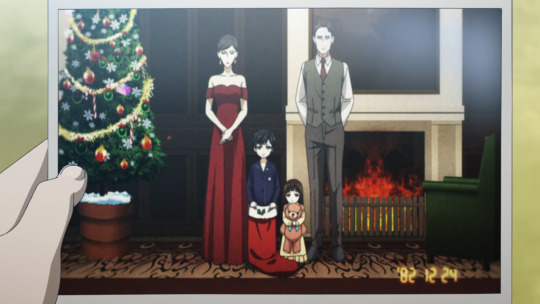
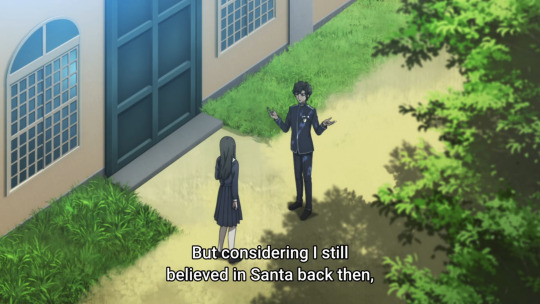
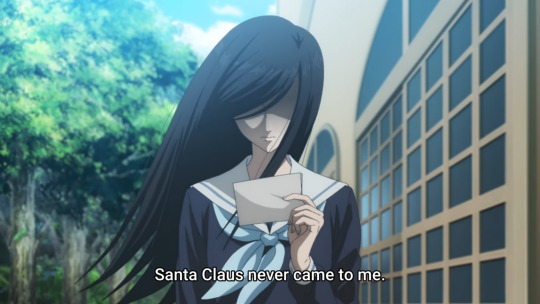
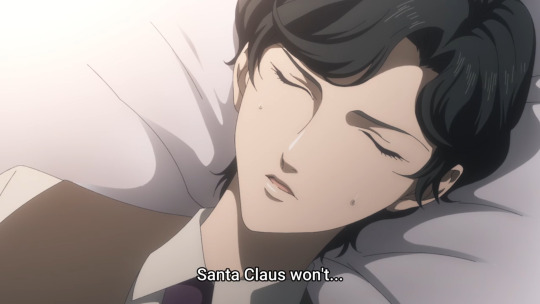
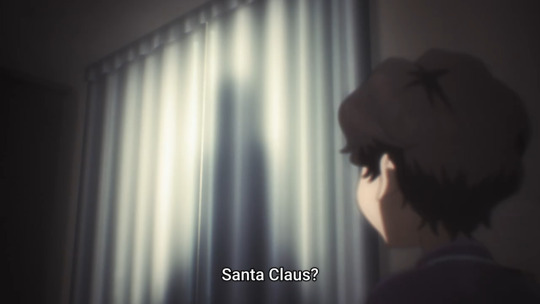
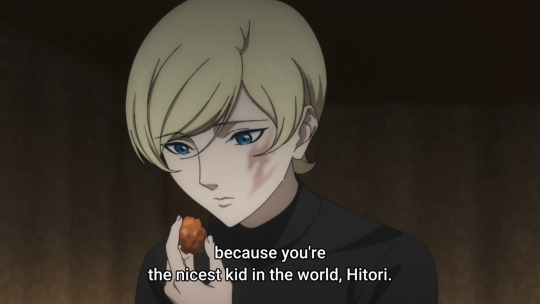
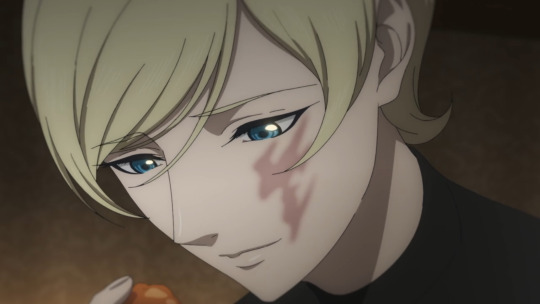
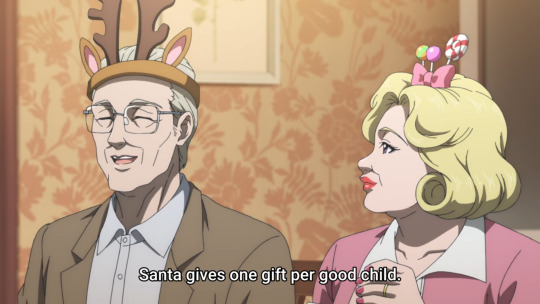
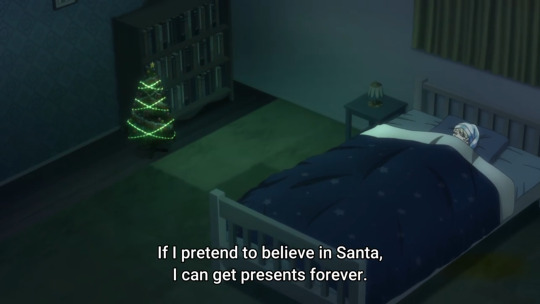
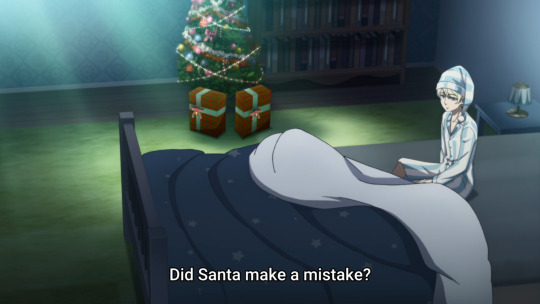
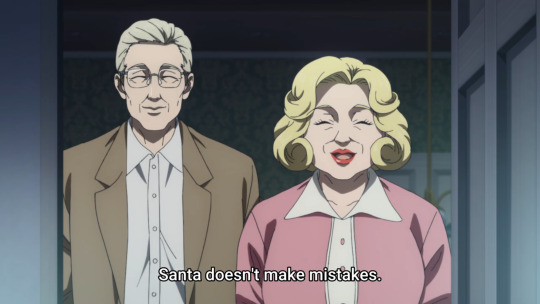
I wanted to talk about this because Santa is heavily associated with Christmas, which has much significance in the story:
On Christmas night, Metry died trying to take back Eiji, who believed that Santa had come to visit him.
When Dali is interrogating Eiji using the Sali persona and asks about the Christmas photo, Eiji brings up Santa and asks Sali if Santa had visited her, to which Sali responds saying that Santa had never came, a clear reference to Dali's tragic past.
The conclusion of the main story takes place during the Christmas season, with repeated mentions of Santa and presents while Dali is forcing himself into Migi's shadow.
On Christmas Day, Dali received his first Christmas present (from "Santa"), and after he was accepted by the Sonoyamas and was encouraged by Migi, he finally left the shadows and accepted himself and his new happy life with them.
Thus, there should be some purpose and meaning behind Sano’s usage of Santa Claus and Christmas.
As most people know, Santa can be seen as a symbol of generosity, childhood innocence, hope and belief, as well love, kindness, and compassion, which were things that Eiji had throughout his childhood. Sure, it wasn’t healthy to live under Reiko’s care, but Eiji was blessed in his childhood, unlike the twins who experienced nothing but hardship. That’s why Dali was angry when Eiji asked about Santa, as he only had loneliness, trauma, grief, neglect, disillusionment, and isolation throughout his childhood, and was likely jealous of Eiji who had such a great life. Santa never coming to Dali could symbolize a loss of his innocence and the fact that Dali’s dreams and desires were never met.
After the twins returned home from the Ichijo house after the fire, Migi finally got to experience the happy family life he’s always wanted, yet Dali stayed in the shadows. He seemed happy that his beloved brother would finally get “visited by Santa”, but I’m pretty sure that Dali wanted it too. Yet, he forced himself into Migi’s shadow likely because of his guilt and self-loathing stemming from the aftermath of his revenge, which is reinforced by the idea that Santa only gives gifts to good children. Indeed, while Dali saw Migi as good, he saw himself as bad, unforgivable, and undeserving of happiness. That could explain why he was so shocked to see that he received a present too. But more importantly, the real present he received was love, a family’s love, something that he didn’t have but wanted deep down for so very long, which is highlighted in his crying during breakfast, as it was asserted to Dali that he was a good boy and deserved happiness too.
A comment on a previous post of mine asked whether this was a Christmas story. In my opinion, it sure is. Although the story is quite dark with elements of revenge, it strongly aligns with many core Christmas themes such as joy, love, family, forgiveness, and redemption, and the fact that pivotal plot events occurred on Christmas certainly cements this idea. That's one reason why I view this story really as Dali's story rather than the twins', as it was all about Dali's struggle in overcoming not just his dark past but his own sins as well as himself, and it was through love and family that he was finally able to accept himself and find redemption.
6 notes
·
View notes
Text
Fight Club, by Chuck Palahniuk
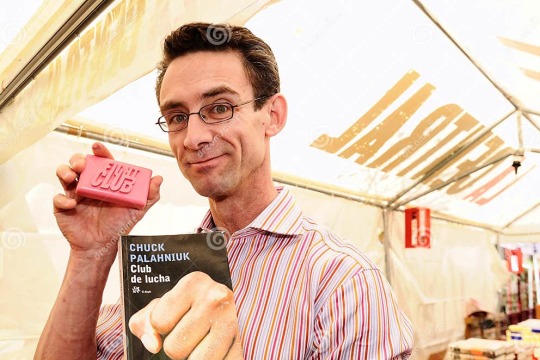
This being a stock photo is very enjoyable to me.
“We are God's middle children, according to Tyler Durden, with no special place in history and no special attention. Unless we get God's attention, we have no hope of damnation or redemption. Which is worse, Hell or nothing?”
"A bit 2edgy4u, but neat ideas about how angry men be angry. Didn’t care a lot for the terse, repetitive writing style to start but I got used to it as the threads came together to the intense climax. And it’s short, so not like it was a huge investment."
Ok, so that’s a pretty terse review. Ironically, considering that “terse, repetitive writing” was one of my criticisms. That was, directly copy-pasted, the review I posted on Goodreads after finishing Fight Club early last year. For a proper Project Hipster post I ought to expand it. And yet— I actually think that covers it pretty well. Let’s break my terse review of this terse novel down into its aspects, then, and see what I meant, in less terse words, and let’s see whether a year and a half to think things over has changed my thoughts. Terse doesn’t sound like a word anymore.
A bit 2edgy4u, but neat ideas about how angry men be angry
The aspect of Hipsterdom that I’ve never gravitated so much towards is that which stems from angsty postmodern 90s Gen X disillusionment, and as I mentioned back in my first Radiohead review, Palahniuk is kind of the epitome of that. And he does do it well.
Maybe I’m just too young to have lived through it, but I can empathize with it. The routine of life in a bullshit job under Capitalism Victorious is as mind-numbing now as it was then, I know well, and the now laughable late millennium rhetoric of the End of History must have added a particularly different sort of catalyst for mental illness. While today it’s the chaos of the world that fills us with anxiety, its seeming stability in the age of Fight Club must have created another sort of dread, living with the apparent surety that this world of fluorescence and linoleum was the ultimate aspiration of society, and now that it had arrived, it would carry on forever. I need the darkness, someone please cut the light!
Is it any wonder, then, that Palanhiuk’s pointedly nameless narrator falls into a sleepless spiral of desire for chaos, wanting to “wipe his ass with the Mona Lisa” and break beautiful things just to experience the thrill of change? That spiral leads the narrator into Project Mayhem, the anarcho-fascist cult of Tyler Durden, a mysterious, rebellious drifter who may be more than he seems, and promises an escape from monotony through rebellion, ascending over the short course of the novel from pranks to terrorism.
A lot of the discourse around this book and its adaptation centres on that always-crucial question – in stories about men lashing out in anger, how much are we meant to agree? The ending of Fight Club (the book, at least; we’ll come back to that point) makes it pretty clear that Palahniuk is hardly holding up Tyler Durden as a role model. But he comes from a place motivated by genuine criticism of a heartless society. Palanhiuk says that its’ “about a lonely person looking for some way to connect with other people." It’s a cautionary tale, then, about the fallout of loneliness and toxic masculinity, but where’s the line that morality is transcended in favour of rage? For the narrator, it’s another character’s death. For the reader, should it be the same? Or earlier? These are interesting, worthwhile questions! I have no definitive answers to them. There are interesting metaphors here, too, like how Tyler steals human fat from lipo clinics, literally the offcast fat of the fattening system, and uses it to make his weapons.
Palahniuk was himself a member of something called the Cacophony Society, which sounds a lot like Project Mayhem purely in name, but reading up on it makes it sound a lot less intense, given that it’s more of an unincorporated counter-cultural arts group. Cacophonists allegedly created Burning Man, paint Banksyesque street art, perform satirical Christmas carols, and disrupt the rush by blocking traffic to host picnics open to all visitors. Oh, and, uh, write edgy novels. Sounds fun, actually. Sounds like that’s a much healthier response to the same things that drive the characters in Fight Club to violence. Apparently the Cacophony Society itself stems from an earlier San Fransisco secret society called the Suicide Club, which focused mostly on urban exploration and the benefits of thrill-seeking.
Didn’t care a lot for the terse, repetitive writing style to start but I got used to it
Yeah, I still think this to some degree. I just prefer purpler prose, on a personal level. But I can respect Palanhiuk’s stylistic choices, to the point that they seem to be impacting these very sentences as I type them. Quotes from Fight Club in my mind are right now bleeding into the way I tackle my own keyboard. One maybe generous interpretation of Fight Club’s writing style is that it’s a window into the narrator's deteriorating mental state. When we’re working around sleepless nights, and when stress and anger are eroding reason into base fight-or-flight instinct, none of us are thinking in full sentences. It helps somehow to know that there’s a name and history for this style as well. Palahniuk was a disciple of Tom Spanbauer, who in Portland, where lives the dream of the 90s, taught the style he called “dangerous writing.” Spanbauer defines the style’s tenets as minimalism, realism, and writing from painful personal experience. In a way it’s very similar to Hemingway’s “one true sentence” approach. It’s another swing of the pendulum in the same direction, I suppose. As Hemingway was reacting against the Romantics, Spanbauer and Palahniuk were reacting to the maximalist “hysterical realism” of David Foster Wallace and Zadie Smith (who I also like.) It’s a style. Can’t fault style for consistency. In terms of repetition, I’m referring of course to the very prominent motifs, like the narrator's constant (and it is constant) reframing of the Reader’s Digest feature “I am Joe’s…”
as the threads came together to the intense climax
And what a climax. I should preface by saying that somehow I’ve still never actually seen the movie. Through cultural osmosis, though, I knew the twist. If you don’t, stop reading. Despite Publishers Weekly calling the twist “particularly bizarre,” despite the use of then-obscure dissociative identity disorder to justify its mechanics, it’s fairly simple in concept. This character seems to be the character’s secret ambitions manifested ad extremis. And it turns out that’s exactly what he is. It’s one of those devices that leads every scene to be read two ways, which is always good, and it makes the climax thrilling. I also know how the movie ends differently. I think in terms of themes I prefer the book version, but I understand why it was changed to a more visually dramatic ending for the movie. I also think it’s pretty funny that the Chinese release of the movie wasn’t allowed to show Project Mayhem succeeding, so it cuts out the end in favour of essentially telling the book ending in captions.
And it’s short, so not like it was a huge investment.
Unlike this post. Sorry. Good thing I don't write these with the assumption that anyone will ever read them.
I give this hipster book four disillusioned white men out of five.
Project Hipster is a futile and disorganized attempt to dive into the world of things that the internet has at some point claimed "are hipster," mostly through ListChallenges search results.
This review comes from the ninth list, Essential Books For Hipsters.
Next up: a more lighthearted movie that can still make you cry.
Stay deck.
7 notes
·
View notes
Note
Hi! Your top 5 characters and top 5 ships?. I'm really curious.
Hello! This is difficult lol because it a very open question. I presume we are talking animanga, so let’s see, because I actually don’t necessarily have charts readily on my mind and I also don’t read that many titles anymore. Some of the most popular manga talked about recently are aimed at a younger audience than me or are very similar to things I have already read, so they don’t hold my interest. And if I think of characters that have meant a lot to me at different times in my life, I probably will end up talking about stories that are quite forgotten now or not exciting for anyone else, because more connected to my own circumstances and life experiences. So if you don’t mind I will give you only three, but I will give an explanation of my choices so that it is easy to see how I could have mentioned other very similar characters from different manga for very similar reasons. But these three I have a visceral and deep connection with, and maybe I also projected a lot, so they stand out to me and came organically to my mind after reading your ask:
Yashiro, from Saezuru Tori wa Habatakanai. Obvious choice to begin with, but I genuinely like characters that can’t conform to other people’s expectations and can’t be “toned down” or “domesticated” because they can’t discard the wild side of their loneliness, rooted in childhood trauma or neglect and lack of basic social support and meaningful connections when it mattered most. And yet, Yashiro faces reality directly because of that. And disillusionment is another trait I like about a character. And I like stories that have darker themes and don’t glimpse over the horrors humanity is capable of, and I like realism too. And Yashiro is a real “queer” character, one that can’t escape “otherness” in a world that isn’t fantastical and where the monstrous isn’t metaphorical.
Griffith, from Berserk. Because he has quite no other choice but to become the monstrous, for the same reasons I indicated above, including queerness, otherness, loneliness and failure to connect or be recognized as human, he can’t exist without provoking a conflict in others, part his own choice of challenging the order seen as “natural”, part because he has to fail in order to set up Guts’s story and fulfill the “destiny of tragic beauty”. This time the world building is very different and the story that starts on the human and historical plane and with a certain amount of realism ends tangled in a bigger picture and bigger narrative threads. He is such an iconic figure, coming to look similar to a whole lot of mythical types and other characters with similar functions in manga and yet avoiding being a simple replacement or repetition and being his own authentically and unique character.
Kikyo, from Inuyasha. I was such an avid reader of Rumiko Takahashi’s stories. I think what I liked most was their settings, the glimpses into a Japanese reality, being the contemporary world of high schoolers involved in quirky adventures or the fantastic past of the Sengoku period full of creatures and specters from a mythical and horror tradition that I got to know this way. Kikyo’s long black hair, her outfit of shrine priestess, with the iconic red and white colors, her ability as an archer: she stands out in my memory, I was in love with her. She was a ghost of herself with only certainty emotions surviving: the fascination with the unresolved. She was angry and vengeful, and yet her love too survived, just darkened. And I like the conflict between her spiritual role and strength and her relationship and connection with Inuyasha, destined both to be outsiders, two loneliness that met, defying the rules. And I think that I quite liked that at the center of her story was learning to let go.
As for shipping… I don’t know if I am even capable of it. I failed repeatedly to commit to it. I see the potential, but sometimes it is more delicious when that potential isn’t fulfilled in the literal sense. Maybe I just enjoy more the tension, than the resolution, the angst more than any “happy ending”: a sense of love as something to bring along and not renounce, even when potentially destructive, but never quite the end goal or only purpose in living. But I like fan theories, fan art and some fanfics, the angsty ones of course. The only pairing I am irrationally committed to might surprise everyone after my little list. But these two characters I have seen together since the beginning and that hasn’t changed and I am still very attached to them as a couple, and my favorite childhood friends becoming lovers proper ship, they are so well suited for each other in my eyes, without being boring together: Kuroo and Kenma from Haikyuu! Surprised?

Sorry for answering so vaguely, but I truly enjoy being open and flexible and I don’t commit truly to some fandom things like lists, ships, or being able to always have a strong opinions about everything. But thank you for asking!
6 notes
·
View notes
Text
Ozu Yasujiro, Tokyo Story (1953) Neil McInnis JPT3391 2024
Ozu continues his commentary on intergenerational relations in Tokyo Story, with his subjects the Hirayamas. However, this time he puts emphasis on the grandparents as well. Shukishi and Tomi Hirayama travel from their small seaside village to Tokyo to visit their grown children. They hope to reconnect with their family and enjoy their golden years in the bustling city. Unfortunately, upon arrival, they are met with disappointment and disillusionment.
Shukishi and Tomi's children, preoccupied with their own lives and careers, have little time or patience for their aging parents. so they are shuffled from one child to another, feeling like unwelcome burdens in their own family's home. Their eldest son, Koichi, a successful and overworked doctor, barely acknowledges their existence. Their daughter, Shige, a hairdresser, is resentful and bitter. Only Noriko, the widow of their deceased son, shows them genuine kindness and compassion. The elderly couple began to wonder if they should've come at all.
As the film progressed, I could feel the same increasing neglect and loneliness that the Hirayamas were feeling. The sweet old couple bore witness to the erosion of traditional Japanese family values, replaced by the American Nuclear Family model, modern materialism, and naked self-interest. Shukishi and Tomi's visit to Tokyo becomes a poignant reflection on the passage of one era to another, the complexities of family relationships, and the inevitable losses of an aging body.
Shukishi is unable to properly grieve for his youngest son who was killed overseas, so many years of bottled-up grief could never effectively be processed. He can't cry, wail, or beg for his son back. It's been too long now. All he has are his memories, though technically weightless, are his heaviest burden.
Tomi is probably the strongest character in the film. Her health is failing, her family is drifting away from her, and her husband is growing depressed and dispirited. Despite all this, she is the rock of their marriage and the family as a whole. She's a bottomless well of love, patience, and understanding. She wants for nothing more than for them to be a happy family again, even if just for a moment.
This film moved me very deeply. When my grandmother was on chemo, she came to live with us. I was only 11 at the time, so I didn't fully understand the gravity of the situation and was kind of irritated that she was taking up a room. It wasn't until Hospice care arrived for her final month that it all hit me at once. From then on, every moment with her was, and remains, the most precious moments of my life. Now, Shukishi and Tomi aren't on terminal chemo care, but they're clearly old and not much long for this world, so when their own children treated them so callously it reminded me of what I was, and what I could become again if I ever forget how important family is to me.

4 notes
·
View notes
Text
Sometimes I think about merging my two WiP Reigen centric fics Splash! and '31' together. Like they could potentially work as one big fic.
But then again... I came up with Splash! with the exploration and idea in mind about the inherent feeling of loneliness and isolation that is born as a result to Late Stage Capitalism. A projection of disillusionment in a promised economy and world that dried up and never was while dealing with social pressures of quote the norm unquote - or societal expectations.
Something something Colapesce, Dimartino's Splash (where the fic gets the namesake from, cause that's the song that first sparked these thoughts lol)
While 31 is about survival guilt, and living past an age you never thought you would get to see and having to constantly choose to keep living. Approached with the intent of something very personal and vulnerable even
In a way, they COULD work as an overlapping fic...but also...idk they have different vibes of approach in my head as well.
For now I think I'll keep them separate
#Progress report#don't worry folks I tend to work by ping ponging between different fics to keep the burn out away#I do also still intend on making that Teruki & Reigen fic: Refrigerator Problem#nico blabs into the void
2 notes
·
View notes
Note
hi, previous anon here! i wanted to ask if my question offended you since it's been a while. if it did im sorry, i didn't mean to come off aggressive or anything lol
If you’re the anon who asked me why I believe Hinamori would try to push forward and “over” her anger and hurt towards Aizen and turn it into something along the lines of transformative justice:
Then no, I’m sorry!! Life has really picked up and I find that I don’t have much time to do most of what I enjoy. I’m not going to lie, the more times passes, the more unhappy I am with that post. I feel like I didn’t get my point across, and that’s in part because I’m really self-conscious about my place in any fandom, and if it’s something I enjoy or something I should finally let go.
But that’s not what you’re asking. Onto Hinamori:
When thinking about her, I get the feeling that she’s someone who’s always wondering:
“am I feeling this right?”
Because I know she’s often characterized as very, very naive - sheltered even - and I mean, sure, everyone has been naive at least once in their life, but I think it’s more about how earnest and empathetic she is coupled with this sense of justice that drives her. (Interestingly, I think the lieutenant with whom she has the most in common is Hisagi.)
I think her course of action doesn’t necessarily align with the Seireitei’s tools - and as a result her peers, and that’s such a specific brand of loneliness. I always go back to these panels:
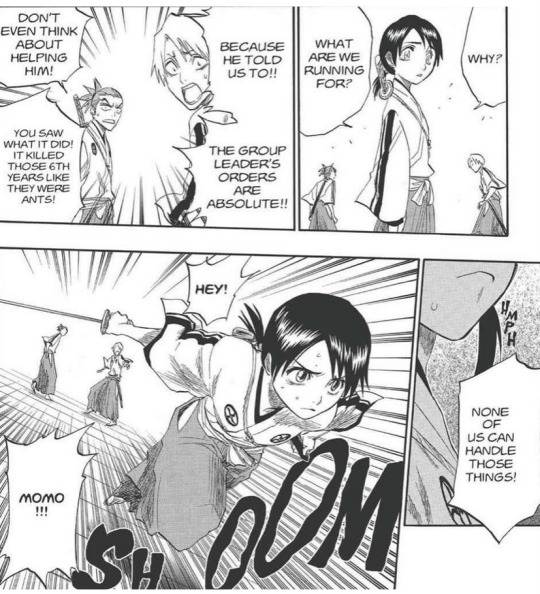


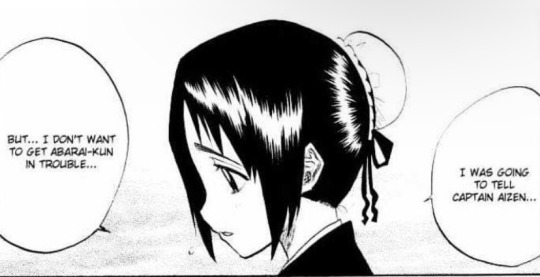
They just scream disillusionment to me. Like she knows not all is as it seems.
(I mean, I think Hinamori wanted to join the gotei because she thought maybe it’s a way to continue her story and oh look, it just so happens that it’s now the only way to continue her story; look at how the stars aligned. Until she learned it was all by design.)
I feel like Hinamori is someone whose entire moral code, the principles that guide her, are constantly being invalidated by their very existence.

She’s seen how that very attitude is used to hurt others, and most importantly, her participation in upholding the status quo, are what weighs on her the most. What about her Rukongai ghost friends? What about the students who are going to be fed to the machine? (I know it would break Hinamori’s heart if she ever found out about the guy from the 12th who joined to get closer to her only to get blown up by his own captain.) What about her subordinates? What about her friends? I feel like Hinamori bears a sense of responsibility to all of this and so much more. As a shinigami, she participates in othering ghosts like her friends (like herself at one point), and perpetuates the inequality. As someone who illustrates for the academy (and whose own subordinate is now an instructor at the academy), does she feel like she’s legitimizing their teaching? And Hitsugaya! I think she feels like she is in one way responsible for him joining the academy and how everything that came from it takes more from him than it gives.
Grappling with what to do with all this, I think, is an important part of her story. The after. What to do with all you know (the memories that haunt you, memories that have been used to hurt you), all you’ll never know (haunted by memories that will never be and could never have been), and proceeding in a responsible way. Maybe Hinamori could learn to distance herself a little more, to stop believing just a bit, but Hinamori also knows what that could do to others (as it has done to Aizen and Hitsugaya), and while it may not look the same for her, I think, she’ll lose more than what she’ll gain. For herself and for a better tomorrow.
Hinamori is not just a dreamer. She dreams big and works twice as hard. If she wants to follow a captain she believes embodied all that she was looking for outside Seireitei’s framework (because remember, it was emphasized that Aizen treated everyone equally, that his students loved him, and that’s something I feel Hinamori was losing hope in ever seeing within Seireitei’s walls), she is going to train until her hands bleed and study until she passes out.


(Top 👏 of 👏 her class 👏. Ki-👏-do ma-👏-ster.)
I know the translations vary, but I remember Unohana saying something like “Hinamori is waiting for someone to call her”, and maybe Hinamori is someone who needs to believe there are parts worth fighting for…and maybe those parts start with the people. She can grow bitter and follow in the Seireitei’s footsteps, like Aizen; she can rage until she hurts parts of herself more than it’s hurts her enemies, like Hitsugaya; she can bury her head in the sand and ignore the creating of another enemy; or she can trust her ideal and learn to work in and outside the Seireitei for the sake of Soul Society. She’s not a pacifist - she has and will continue to disrupt. That could mean being the one dissenting voice. That could mean planting trees that will grow beyond her time.
(That could mean reflecting off of all you hold close.)
#Again I was not offended at all! Consider this a prelude to my answer#I promise I’ll put more effort into answering it! And if this answer is disjointed it’s because I’ve been on a train for almost 24 hours#With 8 hours left to go!#bleach#hinamori momo#asks#bleach meta
29 notes
·
View notes
Note
( heyo friendo!! I just wanted to pop in here and ask what your favorite thing is about writing Aizen! :D )
out.

i am incredibly late on answering this question and i apologize for that.
as for my favorite thing when it comes to writing aizen? oh man, i gotta pick just one thing? just one thing? hm, boy --- that's a toughie but i would say that there's several favorite things so i'll go with what came to mind first.
i suppose i like to explore the nuances between aizen's power and who he is as a person the most. he is, absolutely, a shonen villain. there is no doubt about that. he has killed people. he has murdered innocents, even if not with his own hands. and, in most other shonens i read, those actions are all taken on in the name of gaining more power. and at first glance, it's easy to see that with aizen. and then ... it's not. because i think a lot about what aizen was doing. of what could motivate him to want to take over the position of soul king. he calls it the empty throne in the heavens and that kind of plan and ambition has to take time to ferment and grow. he's not doing this just out of boredom or for fun. he has a purpose in what he's doing.
and then we have that line from ichigo at the end of Deicide that always destroys me whenever i think about it. "maybe he was hunting for someone who could see things from his perspective and the moment he gave up looking, he began to wish somewhere in his heart that he could be just a normal shinigami." and see ... i think that's apt. i really do. ichigo said that once he could fight on aizen's level (which means that aizen was still stronger than he was, even then), all he could feel in aizen's sword was loneliness. and, speaking from personal experience, being seen as strange or Other is -- extremely isolating. and aizen's always been Other, i feel, even as a kid. and being intelligent is also isolating and aizen's so damn smart. he says that the only person who comes near to his own intellect is kisuke.
but lbr gin's right up there with him he absolutely is.
all the same, i've always seen aizen's power being something that's isolated him. he never asked for the power he has. why not turn it to a stronger ambition? why not use it to improve the lives of those around him? like, yeah, aizen is a villain. i'll never deny that. i think it's very sexy of him to be a villain.
but i still keep coming back to that statement from ichigo.

there's so much to be said here, honestly. so i love exploring that with him. i love exploring how much the isolation that aizen's been through all of his life has shaped him and influenced his world views. i love to make it clear that aizen was a victim as well of the system though no one speaks about that. like, the way he speaks to shinji about it is so full of this bitterness with it, this disillusionment. there's so much i could say about his speech to shinji because goddamn that is one of the best moments full of insight involving aizen and i can't even begin to encapsulate it in a singularly coherent manner.
but yeah --- writing aizen is a treat because, sure --- on the surface, to the layman, he comes off as a power-hungry narcissist. i've seen him called that flat out by people. but there's so much more to him than that. i think i just adore getting to explore how he's been shaped into being who he is and how he is more than anything. like there's just so much to him. i want to say so many more things but this is already getting long so lmao I WILL STOP HERE AND JUST SAY THERE'S SO MANY FAVORITE THINGS FOR ME WHEN IT COMES TO WRITING HIM HOW DO I PICK JUST ONE THING?
4 notes
·
View notes
Text
Fugitive Sociality
Blogging is a luxury these days. I don't know what to document, what to say, or what to feel anymore. Waking up everyday with nothing else on my agenda but filling my hours out with the illusion that I am doing something to try stop this genocide. Recently I discovered this account on Instagram called Softcore_Trauma, and have resonated with their memes so much. Here is one example among many:

This morning in the pre-rally meeting, people were saying they didn’t feel anything and did not want to feel anything. We just powered through all of these. Processing is too much and too wasteful of our time and energy. We break into a thousands little molecular communities, each having a hard time connecting to itself, not to mention others. After the rally a friend and I sat down and chat for a bit. He's very active in internationalist labor organizing, asking questions about solidarity and the political potency of de-centralized organizing. I have to admit that despite all the frustration and disillusionment of political organizing as a concept, I still seek comfort and hope in all these little fugitive under-commons, regardless of their temporariness and precarity. I too have an attachment to the idea of an “us” but just can't bring myself to trust the ontological validity thereof. Dissociation from my body, disengagement, and discomfort might be way easier than trying to sort things out among tens of thousands of adult infants. When all these narcissistic maniac assholes are in charge of the whole world, resistance just feels impossible and overwhelming. No wonder the final cut scene of Person 5 resonates with me so much:

Yesterday, out of the need to temporarily rescue myself from panic attack and breathing difficulty, I watched therapeutic anime called Drawer Hobs. I too constantly feel like Noeru, being trapped in a perpetual state of meaninglessness, numbness, and loneliness. In this short story, at least from the way I’d like to interpret it, Kazuchika Kise tells a story of indigeneity and displacement. Noeru's maternal family was originally indigenous of this land that was conquered, urbanized, and gentrified. The grandma used to live here, but later was forced to move to a rural area, where Noeru was born. The normality of a rural girl coming to the city to become a cog of the machine was broken when, one day, her mom mailed a giant ass old dresser to her apartment. Six little kids came out of the drawers to keep her company, help her with housework, and teach her basic adulting skills throughout most of the film. She was told that they are the guards of the “masters” of her maternal lineage.

The days with these guards are dreamy: interpersonal intimacy, respect and recognition in the workplace, and justice in the form of rightful return to one's native homeland. One day, once she seems to be able to "take care of herself", the kids disappear. The disappearance, however, is the director's ideological insistence on the possibility of functional normalcy after indigenous genocide, the ethical, moral, and just life afterwards. It is almost too cruel to think further.

1 note
·
View note
Text
Boulevard of Broken Dreams Piano Notes | Green Day

Boulevard of Broken Dreams Piano Notes
Notes :-
I walk a lonely road
F4 F4 G4 G4# D5# C5
The only one that I have ever known
C5 A4# G4# A4# G4# A4# A4# C5 A4# G4# F4
Don't know where it goes
F4 G4 G4# D5# C5
But it's home to me, and I walk alone
A4# G4# A4# G4# A4# A4# C5 A4# G4# F4
Ah-ah
G4 G4# C5 A4# G4 G4#
I walk this empty street
F4 F4 G4 G4# D5# C5
On the Boulevard of Broken Dreams
A4# G4# A4# G4# A4# A4# C5 A4# G4# F4
Where the city sleeps
F4 G4 G4# D5# C5
And I'm the only one, and I walk alone
C5 A4# G4# A4# G4# A4# A4# C5 A4# G4# F4
Ah-ah
G4 G4# C5 A4#
I walk alone, I walk alone
C5 A4# G4# A4# A4# C5 A4# G4# F4
Ah-ah
G4 G4# C5 A4#
I walk alone, I walk a-
C5 A4# G4# A4# A4# C5 A4# G4#
My shadow's the only one that walks beside me
F5 D5# G4# A4# G4# A4# G4# A4# A4# C5 A4# G4#
My shallow heart's the only thing that's beating
F5 D5# G4# A4# G4# A4# G4# A4# A4# C5 A4# G4#
Sometimes, I wish someone out there will find me
F5 D5# G4# A4# G4# A4# G4# A4# A4# C5 A4# G4#
'Til then, I walk alone
F5 D5# G4# D5# E5 A4# C5
Ah-ah, ah-ah, ah-ah, ah-ah
F4 G4 G4# C5 A4# G4 G4#
G4# F4 G4 G4# C5 A4# G4 G4#
About Song :-
"Boulevard of Broken Dreams" is a song by the American rock band Green Day. It was released as a single from their seventh studio album, "American Idiot," which came out in 2004. The song became one of Green Day's most iconic and commercially successful tracks. Here's some information about the song:
Release Date: "Boulevard of Broken Dreams" was released as a single on November 29, 2004, and it was later included on the "American Idiot" album.
Songwriting Credits: The song was written by the band's lead vocalist and guitarist, Billie Joe Armstrong. He penned the lyrics, which reflect feelings of loneliness, isolation, and a sense of being lost in the world.
Musical Style: The song features a melodic and melancholic sound with a prominent acoustic guitar and a slow tempo. It stands out from some of Green Day's earlier punk rock tracks, showcasing a more introspective and mature side of the band's music.
Chart Success: "Boulevard of Broken Dreams" was a massive commercial success for Green Day. It topped the Billboard Modern Rock Tracks chart and won a Grammy Award for Record of the Year in 2006. It also received critical acclaim for its songwriting and emotional depth.
Music Video: The music video for the song is notable for its striking black-and-white visuals, which complement the song's themes of loneliness and introspection. It features shots of the band members walking down a city street at night.
Impact: "Boulevard of Broken Dreams" is considered one of Green Day's signature songs and remains a staple in their live performances. It has also been covered and sampled by various artists and has left a lasting cultural impact.
Album Context: "American Idiot," the album that includes "Boulevard of Broken Dreams," is a rock opera that tells a narrative story throughout its tracks. The song fits into the album's larger theme of disillusionment and the search for meaning in a post-9/11 world.
The song's combination of poignant lyrics, memorable melody, and emotive vocals has made it a classic in the rock genre and a standout track in Green Day's extensive discography.
Read the full article
0 notes
Text
Mastering Emotions at Passionately Alive
New Post has been published on https://grahamstoney.com/emotions/mastering-emotions-passionately-alive
Mastering Emotions at Passionately Alive

I often feel that my emotions are running my life. When it comes to happiness, joy, peace and love, that’s fine by me; but when it’s fear, sadness, anxiety, loneliness or depression, that’s not so good. We like to think that we’re in conscious control of our lives all the time, but the reality is that everything we do is driven by an emotion of one sort or another. We’re constantly either seeking the pleasant emotions or avoiding the unpleasant ones. Our emotions exist in our subconscious, so we often aren’t consciously aware of them until they pop up strongly enough to interrupt what we’re doing and make their presence felt. But they still play their role whether we acknowledge it or not; and if we ignore them, they just get louder and stronger until we start paying attention.
Our society places a premium analytical thinking and often downplays the importance of emotions. We learn very little about the role of emotions in our lives at school or university; which is ironic considering that it’s not our analytical thinking that is driving our behaviour: it’s our emotions. If we really want to get a handle on running our lives more effectively, we need to deal with how we feel. As a guy growing up in a family where emotions weren’t generally expressed directly but were often bottled up, I had lots of practice at pushing down how I felt for many years. Yet I always knew I had strong feelings; I just felt out of place in a family and society where they didn’t seem to be recognised. A bit like a square peg in a round hole. Not surprisingly, when I did start to deal with some of the emotional pain I had experienced in life, it wasn’t particularly pleasant. But it was either that, or suffer an awful loneliness, anxiety and depression. Emotions are the key binding force between people and being able to recognise and express them is essential for having really meaningful relationships. Empathy is the basis of all deep connections between us, and unless we know how to express how we feel, that’s not going to work so well.
My 20-year career in engineering was great fun while it lasted, but none of the training or on-the-job experience dealt with the topic of emotions. So I figure I have some catch-up work to do. Many women I meet complain about their disillusionment with men who are “like robots” when it comes to their emotional availability: workaholics, perfectionists, pessimists; all working hard to avoid how they feel or just lacking the skills or practise at expressing it. I don’t want to be one of them any more. Coming down with chronic fatigue 14 months ago also had a huge impact on me; one of its common symptoms is that feeling tired and sick all the time tends to magnify any unpleasant emotions; and it’s the emotional and psychological toll that this takes more than the physical illness which causes me suffering.
With all this is mind, I recently drove 900 km from Sydney to Melbourne to attend Nicholas de Castella’s Passionately Alive workshop on emotional mastery. I knew that a theoretical knowledge of emotions wasn’t going to cut it; I had to actually experience how I really felt, pleasant or unpleasant, to release the bottled up emotional energy and get a better handle on dealing with my emotions. I had met Nicholas briefly once before, and from what I read in his Heart Thoughts newsletter, I could see that he was the real deal when it came to putting emotional intelligence into practise and could provide a safe environment for doing so. We also had a bit in common: being the “sensitive” one in families where this hadn’t been validated, left-brained careers that ultimately became unfulfilling, and even the chronic fatigue thing. Nicholas seemed like a compassionate man, and I was pretty sure I’d be able to relate to what he had to say.
I knew I was tuned-in and ready for getting in touch with my emotions even before I arrived: A guy in the barber in Albury had suggested I take a back route to The Basin east of Melbourne, which took me past the turn-off to King Lake, a suburb devastated by recent bushfires with tragic loss of life and property. From far-off Sydney, the bushfires had been a media-frenzy far away, but I felt an immediate sense of heaviness as I drove through the burnt-out forest towards the workshop.
The workshop itself consisted of a 3½ day residential with a series of small group exercises and sharing in pairs. Each day built upon the previous one, as Nicholas shared his insights into the role of our emotions. We laughed, we cried, we danced, we sang, we got angry, we yelled and screamed, and we allowed ourselves to feel whatever we felt without being judged for it. It was all very cathartic. The process was intense, but I never felt anxious about what Nicholas was going to get us to do next. It was tremendously moving, and it was remarkable how close the group felt to each other due to the sharing that was going on and the respect we all showed for each other’s journey through life. During a Breathwork session, I literally felt emotional energy buzzing in my body for the first time.
There’s still a voice from the rational part of my brain that jumps in every now and then while doing any kind of emotional exercise to say that “this is ridiculous!”. Usually it sounds a lot like my mother. But I’m learning to not listen to it so much any more, go with my intuition and listen to my feelings instead. The emotion I struggle with the most is anxiety: it’s not always giving me helpful clues and more often than not, it seems to be getting in the way. Shame gets in the way too, big time. Both stop me from being free to be myself, to do what I want and have the life I truly desire.
Before Passionately Alive, I was feeling pretty anxious about a lot of things: my career, my relationships, and what I was doing with my life generally. At the workshop, I got a lot of my buried feelings off my chest, met other people willing to work at mastering their emotions too, and learned some new tools for continuing to do so in the future. I feel more peaceful now. I had a dream one night shortly after where I was being attacked by a robber, and as I woke in a state of panic I felt the fear rush through my body and leave, rather than hanging around like it used to do. I still wake up in the middle of the night sometimes wondering “where is my life all heading?”, but I’ve got more of a sense that I’m on the right track, whatever that is.
I wish all my friends and family would do things like Passionately Alive, so that we can all have deeper more meaningful relationships. This is the stuff that makes life worth living. If you struggle to find peace in your life or would like to be handling your emotions better, I highly recommend Passionately Alive. One of the ironies my group recognised was that the people who probably needed this training the most were the least likely to recognise it. So if you’ve never had any sort of training or therapy on the topic of emotions, but you just find some areas of life aren’t working as well as you’d like or you keep pushing other people away or pissing them off repeatedly, perhaps this is just what the doctor ordered for you too.
For more information on how you can get your emotions to work for rather than against you, check the Institute of Heart Intelligence website. If you register for Passionately Alive, please mention this website and my name to Nicholas, tell him I sent you.
#emotional energy#emotional intelligence#emotional mastery#empathy#heart intelligence#Nicholas de Castella#psychology#Emotions
0 notes